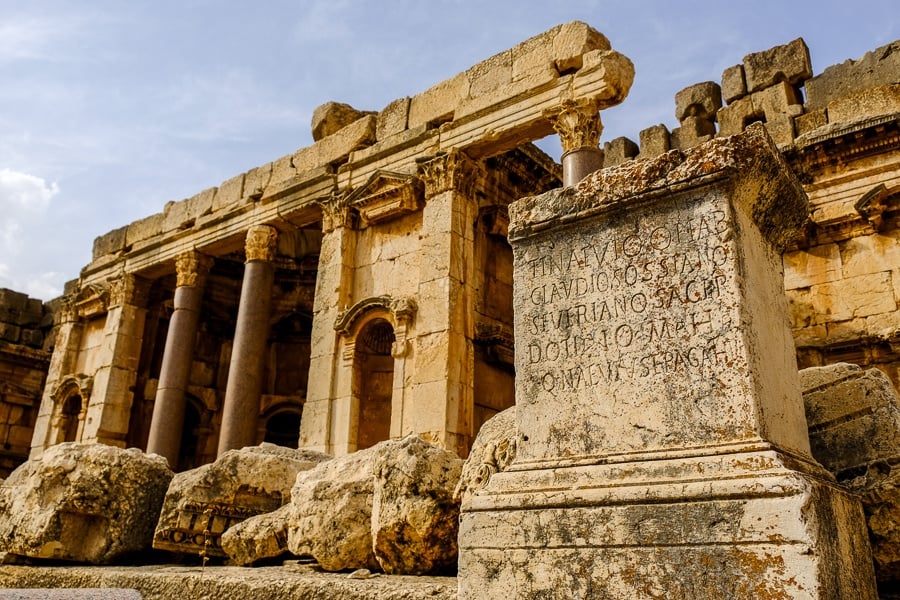One of the highlights of my visit to the Middle East would have to be Baalbek Lebanon, with its Roman ruins and giant megalithic stones.
This temple dates back to ancient times, and it can be visited pretty easily on a day trip from the Beirut area.
These amazing ruins are still in great condition considering their age, so they’re a must see if you happen to be passing through Lebanon or the Middle East.
This travel guide will explain how to get there, and everything you need to know before you go!Best Baalbek Lebanon Tours
First of all, if this is your first time in Lebanon, I would highly recommend visiting Baalbek with a tour package and guide.
GetYourGuide has prearranged day tours to Baalbek from Beirut, including free hotel pickup and drop-off, and a tour guide for the archaeological sites. This is easier and safer than trying to get there by yourself, and you’ll also have a better experience with a guide explaining everything for you.
We’ve used GetYourGuide for lots of tours and activities around the world, and they’re great. Highly recommended!
Book Now: Baalbek Private Tour
History Of Baalbek
The Baalbek valley (also spelled ‘Baalbeck’) has been settled since at least 9,000 BC, and in Bible times it was the site of gory human sacrifices to Baal, the Canaanite god of fertility. Some of the remnants of this ancient civilization can still be seen here.
Baalbek was renamed ‘Heliopolis’ after being conquered by the Greeks, and then it was later used by the Romans as a foundation for a new temple complex that took 250 years to build.
The most notable Roman buildings in the complex were the temples of Bacchus, Jupiter, and Venus. Together, these made up one of the largest temples of the entire Roman Empire.


Over the years, the temple of Baalbek (aka Heliopolis) was damaged pretty extensively by earthquakes, and occasionally plundered for stone.
At different times in history, it’s been occupied by the Phoenicians, Greeks, Romans, Byzantines, Ottomans, and even the Mongols.
Interestingly, some of the Corinthian columns were even disassembled by the Byzantine Empire and used in the 537 AD construction of the Hagia Sophia in Istanbul, Turkey, which is known today as one of the most famous wonders of the ancient world.

Today, Baalbek is recognized as a UNESCO World Heritage Site and it’s generally regarded as one of the best archaeological attractions to see in Lebanon.
Mark Twain, in his 19th century travel memoirs, said that “such grandeur of design, and such grace of execution, as one sees in the temples of Baalbeck, have not been equaled or even approached in any work of men’s hands that has been built within twenty centuries past.”
That may be a bit of a stretch, I don’t know, but Baalbek was definitely the highlight of my trip to Lebanon, and you shouldn’t miss it if you happen to be in the area!


Visiting The Baalbek Ruins
There are a lot of neat things to see in the Baalbek temple complex.
We spent at least a couple hours exploring everything (until a storm started to roll in), but if you’re a big fan of history and architecture then I’m sure you could stay even longer!
In my opinion, the best thing to see at Baalbek today is the Temple of Bacchus. This Roman temple is incredibly well preserved and still looks grand today, with its huge 20 meter (65 foot) columns still standing tall, and many of its sculptures and reliefs still intact.
If you only have a limited amount of time at Baalbek, definitely head over here first!

The remaining six columns of the Temple of Jupiter can still be seen at Baalbek too, but sadly they seem to be covered with scaffolding all the time (for restoration work), so I wasn’t able to take any pictures during my 2018 visit.
Back in its day, the Temple of Jupiter probably would have been the most impressive part of the whole Baalbek complex, but time and the elements just haven’t been kind to it over the centuries.
There are still some partial columns on the eastern side of the complex that are absolutely massive, though, and it’s fun to stand next to these or sit on the big stone blocks for a sense of scale.

Cool side note: one of the megalith stone blocks found at Baalbek is believed to be the largest stone ever quarried in human history, weighing 1,650 tons — over 3 million pounds (that’s not a typo!).
It’s a bit of a mystery how the temple was engineered with such massive stones, and how they could ever be manipulated into place. There are even fringe theories that aliens may have been involved!
One of my favorite things at Baalbek, though, was the Roman inscriptions scattered around the temple complex.
Some of these are still in pretty good condition, and together with the huge stone columns they give the ruins an atmosphere that is pretty awe inspiring.

How To Get To Baalbek Lebanon
Baalbek is located about 90 kilometers (55 miles) northeast of the Beirut area.
You can do this drive in a rental car, but I wouldn’t recommend it unless you’re familiar with driving in the Middle East.
Traffic in Arab countries can be a bit dangerous and chaotic, so you’ll be much better off going with a driver who’s familiar with how the traffic works here.
The best idea is to book a prearranged day tour to Baalbek with an established company (more on that below).



More Lebanon Travel Tips
Thanks for looking! I hope you enjoyed this travel guide for Baalbek Lebanon (also spelled ‘Baalbeck’). The temple, ruins, and giant stones here are just fascinating.
Don’t forget to check out my complete Lebanon Travel Guide for more information before you go!
2 comments
So tempting! Also, there are claims that the Indians came in 4300 BC and built the original buildings.
Interesting!